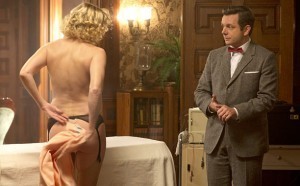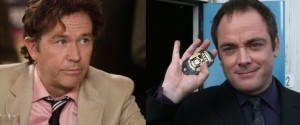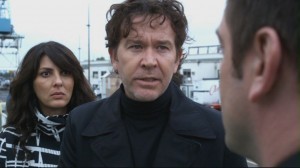Jennifer Crusie's Blog, page 270
April 12, 2014
Cherry Saturday: April 12, 2013
April is National Welding Month. Just in case you were looking for a hobby. Or a new career.
April 10, 2014
True Facts About Science
I was never very good at science. You have to have some focus to do well there, and I was always getting lost in color and shape and story and wandering off. But I can pay attention for four minutes, one of the many reasons I like Ze Frank’s True Facts You Tube series.
Here, watch this one on chameleons. (SpitTake Alert: Do not drink anything while you watch.)
Or if you’d rather, here’s one on the mantis shrimp:
Or this one on the katydid, which is really a conversation between the katydid and evolution. There’s some swearing.
The one on the fruit bat is excellent but dirty (I have a thing for fruit bats because of Pratchett). The one on the land snail is downright pornographic. Okay, most of them are borderline perv. Oh, watch the one about owls. That’s a good one.
Science. Yeah.
April 9, 2014
Questionable: Positive and Negative Goals
Robena asked:
I remember that you wrote about negative and positive goals some years ago, but I forget what you said. Can you explain why Courtney wanting to keep her job is a negative goal? I’m thinking it might be why my current protagonist story isn’t exciting me.
The push in your story comes from your protagonist going after her or his goal.
Okay, look at those verbs: “push,” “going after.” They’re active, they move forward, they exert pressure. That’s what a positive goal does: it gives the protagonist something to pursue, it makes her move forward (and with her, the plot), it sends her actively after something concrete.
A negative goal often pretends to be a positive goal, but the verbs give it away. Courtney wants to keep her job. The goal itself is specific and concrete, the job, but look at the verb: “keep.” Not “go after,” not “achieve,” but “keep,” stay in one place, don’t change, avoid action.
A positive goal forces the protagonist into action against the antagonist which moves the plot and leads to character change.
A negative goal forces the protagonist to stay in one place and prevents her from changing while the plot stalls around her.
A positive goal means the protagonist says, “I want that and I MUST HAVE IT!”
A negative goal means the protagonist says, “I’m not going to change, no, I won’t do that, no, I won’t do that, either, no, I’m definitely not going to do that. Leave me alone, I want everything to stay the same.”
For some perverse reason, I almost always begin with a negative goal. Courtney doesn’t want to lose her job. Zelda doesn’t want to stay at Rosemore. Liz doesn’t want to go home. Alice doesn’t want to sell the house. Zo doesn’t want anybody to notice her or her foster kids. It’s like a mental tic with me, they all say, “JUST LEAVE ME ALONE.” So that means I have had to learn to turn negative goals into positive goals which is just a pain in the ass, but that’s writing for you.
So:
Negative: Courtney doesn’t want to lose her job.
Positive: Courtney wants to find the proof to unmask her duplicitous manager, Jordan, for the thieving, employee-framing douchebag he is.
Negative: Zelda doesn’t want to stay at Rosemore.
Positive: Zelda wants to find out who her father is because she has a blood disease.
Negative: Liz doesn’t want to go home.
Positive: Liz wants to clean up her mother’s life in twenty-four hours so she can drive to Chicago without guilt and make a lot of money.
Negative: Alice doesn’t want to sell the house.
Positive: Alice wants to exorcise the ghost of her Aunt May before the fake parapsychologist who wants to buy the place gets somebody killed.
Negative: Zo doesn’t want anybody to notice her or her foster kids.
Positive: Zo wants to establish her foster kids in a safe house, but the only one available to her is full of killer magic robots and is possessed by an AI with a split personality.
Whether you like the positive goals or not, they’re all a helluva lot more interesting because they’re about people wanting something specific that they’re going to have to struggle to get.
Negative goals kill story. Positive goals power story.
The Wanderer’s Guild to Story Evolution
Kelly asked about “Cold Hearts,” so here’s an update that shows how I work from idea to story. Sort of. Not really there yet. (I know I talked about this already in the Questionable: Turning an Idea Into a Plot, so think of this as an example of that. Kinda.)
A long time ago, I wrote a story called “Hot Toy,” about a woman named Trudy who, on Christmas Eve, was searching for a toy that had been promised to her nephew Leroy by his no-good-rat-daddy who had run off with nanny. Trudy had a sister named Courtney who wasn’t handling her husband’s desertion well: she was drunk and ripping the arms off gingerbread men and dipping them into her gin. I hate gin, so I’m not sure why I picked that particular poison, but there was something about a woman who would do that that intrigued me. She was bitter, but she loved her son and she was trying to cope, but it was Christmas Eve, and she was going to have to explain to her little boy where Daddy was the next morning along with why there was no Major MacGuffin doll under the tree, so for one night she got drunk and made gingerbread. She was always there in the back of my head, and then one day she showed up talking in this jewelry store so I wrote it down.
What I got wasn’t a scene, of course, it was just chat. For me, it always starts with chat. But it was a first draft so that was okay. So there’s Courtney, some years after her divorce (anywhere from two to six), working in a jewelry store and being patronized by her boss, Jordan. She was still angry and frustrated, but not so much at her husband any more because she’d written him off, more at life in general. And there was Henry, the security guard, a grandpa kind of guy, and Laura Nyro singing Wedding Bell Blues on the store stereo. So Courtney’s talking to Henry, and he’s trying to support her and then a thief showed up, and I liked him, but he wasn’t a love interest and I wanted this to be a romance. Probably. So I sent in another guy. I thought he might be a cop, but that was boring and predictable, so I kept writing and he turned out to be another thief, and he worked as the love interest so that was more interesting. The conflict was still all over the place with way too much info dump, but hey, first draft. Then I wrote a scene with Courtney trapped in the vault with the thief/love interest (I kept giving him different names) and a scene with Courtney talking to her sister Trudy the next morning and then a bunch of text messages between Courtney and the love interest (still looking for a name). The problem is, none of that taken together as a plot was story. It was Stuff. Story is a protagonist and an antagonist in a life-or-death struggle, not some woman who doesn’t like her boss. Hell.
So I wandered off to work on one of the ten million other things I had to do.
Because here’s the thing: sometimes stories need to time to rise, like bread. So the story rises, and you work on it and punch it down, and then it rises again. There’s no point in forcing things, especially if you have other stuff to work on.
I kept thinking about Courtney. It was clear that there had to be an exterior plot with an exterior antagonist for her, either as a main plot or as a subplot to the romance plot, and there was Jordan, already a problem, so he could be an antagonist as long as he was actively out to get her. So, okay, he wasn’t just annoying her, he was persecuting her. But why? What did he want? And beyond that, what did Courtney want? To keep her job, but that’s a negative goal, she needed a positive goal. So I was a little bit farther along, I had a protagonist and an antagonist, but no conflict, so there was still no story there.
I wandered off again.
Then one day, I started to think about the vault. What’s in there? I was going with a pink diamond, but that was boring (although the half hour of research I did was fun). Then I read about Egg MacGuffins and thought, “I want to write one of those” and decided it was a Faberge egg with pink diamonds. And something else, a secret compartment that everybody wants into. Although if it’s in Jordan’s vault, he can look in the compartment any time he wants. He can’t steal it, but he can look in it. No, that wasn’t right.
I wandered off again.
The next time I wandered back, I looked at the story world. There’s Courtney, with Trudy and Nolan and Leroy in her family and Henry at work. And there’s Jordan and whoever owns the jewelry story, let’s call him Winthrop Wallace. Is Winthrop Wallace on Jordan’s side or just clueless? Who else is on Jordan’s side? He has to be powerful, more powerful than Courtney, so let’s give him Colin, the first thief; that means Jordan’s robbing his own store. Also, Jordan’s a dope, so that’s not going to work, a good story has a strong antagonist. That means Jordan’s a dupe or a minion, and the real antagonist is lurking behind the scenes. Powerful, rich, we don’t like him. I’d been reading about the Koch Brothers so I thought somebody like them, entitled, using their wealth to maintain their wealth, convinced they were the backbone of the country while they destroyed it. But two rich old white guys are no fun. How about two rich sisters with an agenda? The Cork Sisters. They’ve created a private foundation and they sit like spiders in the middle of it and play games with people’s lives while advancing their own ends. And the name of the foundation is the The Cork Board. I loved that. Didn’t know what to do with it.
Wandered off again.
Then as you know, I’ve been watching Leverage for the Sunday community analysis posts, which, not surprisingly, has made me want to do a community con story, that little guys against the powerful rich . . . oh, wait a minute. So the Cork Sisters are using Courtney–uh oh, that name similarity is not good, but I can’t change either so just hell–to achieve their nefarious ends. They want the Egg MacGuffin for a reason to be named later. It’s in Winthrop Wallace’s vault and he won’t sell it to them for a reason to be named later. So they have to steal it, but they have to cover their tracks, so they corrupt Jordan through an intermediary and send him Colin (where the hell did I get all these C names? that’s going to have to change) to rob the store, only to be foiled because Tenn shows up, for a reason to be named later. (Oh, yeah, I decided to name the love interest Tennyson because it appealed to me. Last name: Dempsey, because why not.)
I like all of that that. Maybe I can find a way to change Courtney’s name. Worry about that later. Bigger worry: That huge coincidence that Tenn shows up just as Colin’s robbing the place. I’ve already figured out that Winthrop Wallace is blackmailing Tenn to steal the Egg, although since Wallace owns it, I haven’t the faintest idea why. But that gives me a dynamic, Wallace vs. the Cork sisters, using Tenn vs. Colin to struggle for the Egg.
Yeah, but my protagonist is Courtney and I want to write a team caper.
So Jordan is going to steal the Egg and frame Courtney and she finds out about it. I have some ideas about how that happens, but they need work. Later for that, I’m on big picture stuff. Courtney needs a positive goal and a team to help her get it. She’s already got Henry, and she can co-opt Tenn. She can’t involve Trudy because Trudy’s married to the law. If I’m using Leverage as a rough model, I need a mastermind, a hacker, a thief, a grifter, and a hitter. And I have Courtney, Henry, and Tenn, who at least is a thief. Hell, that doesn’t work.
I wandered off again.
Then one night I was rewatching some old Blacklist episodes and saw the scene where unidentified bad guys are watching Liz’s house on multiple screens from a set-up across the street, and I thought, “That’s how Tenn knew Colin was robbing the store.” Wallace set him up to surveil the place because he knew the Cork Sisters would be sending somebody after the Egg MacGuffin. Which means that Tenn knows about Jordan and Henry and definitely Courtney because he’s been watching them. Probably no sound, though. Huh.
I wandered off again. Hey, I have a lot of stuff to do and this isn’t even under contract. Besides, I needed to think.
Then listening to the commentary on the Leverage DVDs, I started to think about the Courtney team. Mostly, what the hell Courtney would bring to the table. She’s a single mother who works in a jewelry store, not a lot there to help with a caper. But she must have been something before that. She and Trudy grew up with a super conventional, super critical father, and she’s the youngest, so she would have rebelled. Dropped out of college, no, didn’t go to college, wanted to be an actress, no training, ended up as a magician’s assistant. Learned sleight of hand, how to pick pockets, create illusions, then she met Prescott, that rat bastard, when Trudy brought him home, married him, had Leroy, got divorced. Tried to get her old job back, but the guy she worked with already had an assistant. How’d she end up in the jewelry store? That has to dovetail with the rest of the story, maybe be part of the story, so later for that. The whole thing creaks, but I can oil it up later.
So Courtney can do all of that which would put her in the thief category except we already have a thief. So maybe Tenn’s a lot more, maybe he’s the mastermind, the big picture guy, and Courtney’s the detail girl. That means I need a hitter, a hacker and a grifter. So I’ll give Henry a police record for conning people. That was easy. Hacker: the jewelry store needs more employees so there’s a college grad student working there part time at night. Madison. Madison knows computers. I don’t know what she’s a grad student in, but she can hack enough to serve their needs. Those four would be enough to turn the tables on Jordan, but then he’d call for back-up and the Cork Sisters would get tough. Fortunately, Our Team knows a hitter: Colin. Colin’s been double-crossed so Courtney talks him into joining them, probably at the midway point. There’s a Leverage team. Then later, Courtney can co-opt Trudy if they need more help, although Trudy’s a librarian, so unless they need research . . .
But that’s too many people on Courtney’s side. The Cork Sisters have Jordan, who’s worthless, and Colin, who’s been double-crossed. They need some muscle, so I’ll give them The Brothers, four goons with brains. And the Sisters would be watching Courtney, too, so I’ll give them Dan, who up to now in the free writing I’ve been doing, was just a blind date for Courtney; that’s good, now he’s got a night job in the plot. And the Sisters will need a secretary, so I’ll give them Harriet, a fluffly little blonde with no morals who’s willing to kill for them. That’ll even things up.
So the story starts when the Cork Sisters send Colin in to steal the Egg MacGuffin (why? I have no idea) and Courtney and Tenn foil the theft. The first turning point has to be when Jordan tries to frame Courtney and she escapes, but suspicion has been planted, so she pulls together the team to fight back. The mid turning point is when things get desperate and the Cork Sisters send in the Brothers, and the team drafts Colin as they go on the offensive to prove that Jordan and the Cork Sisters are thieves. The crisis is when they lose (Courtney gets arrested?) and they shift their plans and make a final assault and win, of course, this is a Crusie.
Yeah, that’s weak. Plus, I have Courtney, who still has a negative goal vs. Jordan, who’s a pawn of the Cork Sisters, with the real conflict taking place off the page. Unless I can somehow invest Courtney in Wallace’s fight against the Cork Sisters. Hmmm. Unfortunately, I have things I have to get done, so I’ll be wandering off now. Back later. Maybe. Must cogitate.
If at some point in the future, “Cold Hearts” actually becomes a published story, it’ll be interesting to see if any of this makes it to the final version. Because for me, writing a story is a constantly evolving process based on wandering around a lot, stealing from everything I see, and then changing everything and moving it around until it feels right, and then changing it some more as I write. And then changing what I’ve written.
I’d write more, but I have to catch up on the rest of my work.
She said, wandering off again.
April 8, 2014
Questionable: Love Scenes, Sex Scenes, Erotica
S said:
I would love to hear more about the difference between making love, having sex and erotica in a romance novel. What exactly makes them different from each other? . . . I always hear it described as ‘different levels of sizzle or heat’ but it seems to me that there is more to the grading than that. . . . Are there market expectations now re detailed sex? Romance novels seem to be getting more and more graphic (or maybe those are just the ones I’m buying!) I noticed in the [comments to the favorite love scene post] how few people listed a love scene that had any sex in it – I think I spotted one that took place in a bed. That’s interesting.
Sex is in the eye of the beholder.
Let me put that another way.
What’s hot is subjective. Sex scenes that some people think are tame are considered porn by others. Therefore, there really aren’t any clearcut guidelines for telling the difference between romance novels with sex scenes and erotica because it’s a combination of writer intent and reader reception. The closest I can come is that in a perfect world, all sex scenes in romance novels would change character and advance the plot and thus be an intrinsic part of the story and not there to titillate the reader. In that same perfect world, all erotica would be written to deliver sexual titillation to the reader without diluting the erotic charge with plot and character change.
That is, romance novels would be about the stories, and erotica would be about the sex.
In the real world, the distinction, like sex, is a lot sloppier.
There are romance writers who drop sex scenes into their stories because they think readers want sex in their stories, and so they don’t much care if the sex moves the plot or arcs character, they’re just trying to write hot sex to satisfy readers. And there are erotica authors who spend time on story because they think that a role-playing context makes their stories more erotic. Neither of these groups of writers is wrong because there are as many different kinds of readers as there are writers, and somebody will buy and enjoy their books.
So the difference between romance novels and erotica? It depends on who’s reading the book.

This is erotic, but it’s not erotica.
.
Within the world of romance, the distinctions continue to be subjective. Generally a romance described as “sweet” has no sexual content at all. After that, my assumption would be that the content would determine the level of heat, but the characters in my books all have vanilla sex–that is, nothing that’s surprising or shocking or even all that interesting–and I’ve still seen my books labeled as hot.
(Okay, small time out here for a story I have to tell about sex scenes in my book and the fallout thereof. I come from a small town in Ohio, and a couple of years ago a women’s group invited me to speak. My best friend from high school, Gretchen, e-mailed me and said, “You almost got blackballed from (name of club withheld here because they were lovely people).” You have to hear that sentence in Gretchen’s voice–rich and full of laughter–to appreciate how funny that line is. Apparently a woman named Beany (last name withheld to protect her privacy) said that I should not be invited because there’s oral sex in my books, and the rest of the club overruled her. YAY. Then I made the mistake of telling my mother that, my mother who tells me she’s read all my books:
Me: “Beany (last name withheld) didn’t want me to speak to the club.”
Mother: “Why not? Your books are wonderful. I’ve loved every one of them.”
Me: “Because there’s oral sex in some of them.”
Mother: “THERE’S ORAL SEX IN YOUR BOOKS????”
She was also sure my daughter was a virgin birth, but that’s another story.)
So honestly, I have no idea how the industry assigns hotness, and I have a feeling the industry doesn’t, either. To paraphrase Justice Potter, the industry can’t define it, but it knows when it sees it. I never worry about it; I just write the story the way is needs to be written and let everybody else sort that stuff out.
Now let’s move on to more practical stuff: How are you going to handle sex in your novel.
If you’re writing erotica, any plot you’re using is a scaffold that supports your sex scenes because people who buy erotica want to be turned on, and there is nothing wrong with that. Nobody should do the literary equivalent of slut shaming: erotica is just another genre. Unfortunately, I can’t tell you much about it because I don’t write it or read it. My GUESS is that any plot you choose should provide an erotic context to heighten the tension in the scenes without adding so much detail that the power of reader arousal is undercut, but again, I don’t know anything about writing erotica, so never mind.
Romance novels, I know. My advice there–and this won’t be new to longtime readers of the blog–is “Don’t write sex scenes.” Instead write scenes that move plot and arc character, and if those characters are having sex, have at it. If you write a scene in which the characters have sex but the plot stays in the same place and they’re the same people after the scene that they were before, cut it. The sex in that case is garbaging up your story in the same way too much story can garbage up the erotic part of erotica. Decide what you’re doing and focus on that.

The focus here is pretty clear.
.
So how much sex do you need to put into a romance novel? It depends on the romance novel. (Yes, I know this isn’t much help. Ask easier questions next time.) How much sex a story needs depends on what happens during the plot and what happens during the plot depends on the kind of characters whose actions are driving the plot. Character is the reason the sexiest scenes may have no sex in them at all, while some explicit sex scenes are about as erotic as a shopping list. That’s because actions without context have no emotional impact; that is, unless you’re invested in a character who’s invested in the action and who is experiencing emotion because of that action, you can write detailed sex scenes that leave your reader yawning. But if your character is invested emotionally in the action, and if that action does change her, then your reader will be affected by that action, too, so you can write vanilla sex scenes with very few details that have a highly erotic charge because your reader is invested. A single glance across a room or a brief kiss can be hotter than a stereo-instructions-insert-Part-A-into-Part-B explicit sexscene because of the emotional impact on the reader.
That means that the key to writing sex scenes in romance is to write what your characters feels, not what she’s doing. Anybody who’s reading your book has either had sex or seen it on cable TV; she does not need instructions. What she wants is what every reader in every book wants: to experience the story through the protagonist, see what she sees, feel what she feels, become a part of the story vicariously. Adding detail can make a sex scene less arousing because it undercuts reality. Think about the last time you had sex. How much detail did you actually notice? How much inventory did you take of your physical surroundings including the other person’s body? Generally speaking, if you’re really turned on, your thoughts tend to scramble into a driving blur, interrupted only by sensation. That’s why, when I’m writing a scene in which the sex is not working, my characters notice detail and have complete thoughts: They’re not turned on. (This is where I should point out that the sex scenes I’m most known for are Bad Sex Scenes, which means somebody else should probably be writing this post.)

This is definitely a sex scene even though they’re not having sex.
So right now I’m working on a novella in which two strangers are locked in a vault, fight, and then knock off a quickie fueled by a lot of conflicting emotions. They have sex, they don’t make love, because they’re not in love. Because they’re both so tense, the sex feels great, and because they’re not emotionally involved, it doesn’t change either of them during the act. Here’s the sex scene:
.
Yeah, I didn’t write it. I wrote the scene before it in his POV and I wrote the scene after in her POV, but I didn’t write the act because nothing of interest happened during it. They had good, fast sex to blow off some steam and that was it. Absolutely no reason to describe it.
I’m working on another book (yes, I have a focus problem) in which two people go back to his place and have sex, and while they’ve only known each other for two days, they do know each other, they have friends in common, they’re part of the same community, so the stakes are higher. Neither one of them thinks it will be Forever, but they like each other, so there’s some investment there. And things happen when they have sex that surprise them both, small things that need to be on the page and so, as much as I do not want to write a first person sex scene, as much as I would do anything to duck that sucker because writing that much emotion and sensation using “I” always sounds like Too Much Information to me, I am going to have to cowgirl up and write that scene because it moves plot and shifts character.
The character of the people in your stories not only dictates the frequency of sexual activity in your story and the emotional impact of the sex, it also dictates the kind of sex they’ll have, especially the first time. Sophie the con woman from Welcome to Temptation got conned into sex on a dock, art forger Tilda from Faking It faked it, and Cranky Agnes from Agnes and the Hitman had angry sex. The way a character makes love is character, and it changes depending on the character he or she is having sex with.

This is generic sex.
.
That means that if a sex scene is so generic that it can be dropped into any book, it’s death for your story because it’s going to flatten character. As Lord John Whorfin says, “Character is what you are in the dark,” and if your characters are in the dark, naked, meshing body parts with somebody they care about, you’d better believe that character change is happening because that sex is going to embody who they are at their deepest levels, their fears, their secrets, their darkest needs, their strongest yearnings. Sex scenes are boring; scenes in which your characters have sex that only they can have because of who they are and that changes their characters and shifts the plot lines are fascinating. A lot of readers skip sex scenes; if you write your romance so that every word counts, they can’t; they’ll miss too much story.

This is interesting sex.
.
As long as you remember that the sex in your story has to happen because of the characters in your story and that what they do has to result from their hopes and fears and needs, from who they are, you’ll be fine. Don’t worry about whether it’s not hot enough or too hot and definitely don’t worry about what people will think of you (except for Beany, she’ll judge), just write the scene the way your characters demand, and you’ll be fine.

We don’t judge.
Standard Disclaimer: There are many roads to Oz. While this is my opinion on this writing topic, it is by no means a rule, a requirement, or The Only Way To Do This. Your story is your story, and you can write it any way you please.
April 7, 2014
Good Deals: Acorn

You know how much I love Voodoo Pad. No, this is not another post telling you to buy Voodoo Pad. However the same people have another program, a Mac OS X 10.8 & 10.9 picture and image editor called Acorn, that’s been getting great word of mouth. I’ve just started to use it, which means I’m not an evangelist for it yet the way I am for the wiki software, but when a company I like holds a sale on well-reviewed software, dropping its $49.99 price to $14.99, I figure you should know.
From the nice people at Flying Meat:
Acorn is on sale at this very moment for $14.99, down from its normal price of $49.99. Acorn has never been offered at such a discount, and that’s counting upgrade prices as well. So if you’ve been holding out on upgrading, now is the time to do it! And if you already own Acorn 4 – why not forward this email on to a friend?
Download Acorn 4
Buy Acorn 4 directly from Flying Meat
Buy Acorn 4 from the App Store
I consider this the same as forwarding an e-mail to a friend. No, I don’t know anybody at Flying Meat. No, I don’t get a cut. Jeez, people, where’s the trust?
It’s Monday: Be More Dog
My friend Sue D. showed me this:
Happy Monday! (I draw the line at frisbees, though.)
April 6, 2014
Leverage Sunday: “The Three Strikes Job” and “The Maltese Falcon Job”
So let’s talk about competent protagonists.
The Leverage producers have a phrase they’re fond of: competence porn, the thrill viewers and readers get watching or reading about somebody who is really, really good at something. I prefer watching a protagonist become competent through the struggle with the antagonist, but I will not deny that I loved watching the five people who made up the Leverage team ply their skills from the beginning. They were all damn good at what they did, that’s why Victor chose them (except for Sophie; Nate chose Sophie). Some of my favorite Leverage moments are watching Parker leap off a building, Hardison hack the back of a hotel TV, Eliot facing four guys with baseball bats and saying, “This is hardly fair,” then seeing two more show up and saying, “Now it’s fair,” and kicking everybody’s ass. Sophie’s grifts are poetry; watching her hook Victor in the pilot is thing of a beauty. And then there’s Nate, the embodiment of Irene Adler’s “Smart is the new sexy,” quick-thinking, experienced, bold, smart, and powerful. It takes him an entire season to build his team of misfits into a family, and then he pulls off a miracle in the season finale and defeats the bad guy AND his nemesis Sterling. Nate is competence porn in the flesh.
So now what are you going to do with him?
One of the problems with an ace team is that they’re hard to defeat and that makes it tough to write story tension. The best stories have protagonists who are out-matched, out of their elements, on the run, and the Leverage team, ensconced in Nate’s apartment, eating breakfast at his table, having meetings downstairs in the bar, are never out of their element, even when they’re on the road. So to even the playing field, the writers focused on the rot from within: Nate’s a drunk. The first season finale is the team’s attempt to stage an intervention: help Nate bring down the man who let his son die, and Nate would come back healed.
It works to a certain degree: Nate sobers up. But he trades an addiction to booze for an addiction to power and vengeance, and season two is a little less fun because of that: Nate sober is mean as hell. Not only that, his thirst for vengeance on all the rich guys who prey on those beneath them means that he’s taking bigger and bigger risks and dragging the team with him. When he starts drinking the fourth episode from the end of the season, it’s the worst of both worlds: he’s drunk AND driven by his demons, which is how they end up in the mess with mayor of Bellbrook, MA, and a vicious arms dealer (Richard Kind and Paul Blackthorne, two of my favorite actors ever).
So the competent protagonist gives you a paradox of a problem:
How are you going to defeat him if he’s so damn good at what he does?
If he’s not that damn good at what he does, how are you going to portray him as competent?
This is one of the many reasons I like an incompetent protagonist who storms through her plot picking up skills and confidence and becomes competence porn: That’s an easy protagonist to write. But those protagonists pretty much work for one story, or if you’re on TV, one season because the payoff is the competence, that’s the reward at the climax. If you’re going to go on to a second book in a series, a second season, you’ve got a competence porn problem, how to deliver and still arc character.
Which is what “The Three Strikes Job” and “The Maltese Falcon Job” are all about. Throughout the season, as Nate takes bigger chances and ignores his growing problems, the three younger members start to bond together and Sophie leaves. Then at the beginning of “Three Strikes,” Nate gets hit with a triple: his friend in the state police, Bonanno, is gunned down; the hospital where he fights for his life brings back all the despair of his son’s death, and he can’t reach Sophie when he needs her desperately. When he goes to meet the team to look into the attack, he loses it and screams at them, and there’s a clear moment when they all realize he’s losing his mind. Hardison pulls him back by giving him the detective problem of finding out who shot Bonnano, but that moment in the beginning haunts the rest of the episode, driving it to the point at the end (the midpoint of the two-parter finale) where they’re trapped, their safe house blown, and on the run. Nate pulls them together at the beginning, but for the first time he has a team that’s actively angry with him and more than willing to tell him they don’t trust him. When even Parker tells him to shape up and “be the man we came back for,” he makes an even more audacious plan, a plan that would have worked except for one thing.
Sterling.
Any Leverage episode with Sterling in it is fun because he and Nate are doppelgängers, so evenly matched that at the end of every confrontation they always both win. But this time, Sterling has Nate, trapping him when he goes back to his apartment for his son’s drawing (Sterling, you bastard). Nate still tries to work the angles as Sterling looks at him with real sorrow for how far he’s fallen, accepting defeat only when Sterling tells him he can’t finish the con unless he becomes a witness, in return for which, Sterling will let him go free. Defeated, Nate says, “And my team goes free, too,” and Sterling says, “No. Just you.”
That’s one of those moments when you realize that Sterling doesn’t understand Nate at all. Yes, he’s a control freak, and yes, he’s a drunk, and yes, his reckless thirst for revenge against white collar predators has brought them all down, but the idea that he would betray three people who have become not just his team but his children . . . Sterling, what were you thinking?
Nate gets back on his feet, plays the FBI against Sterling’s Interpol, and both of them against the mayor and the gunrunners, and even so, he’s about to get shot when Sophie walks in, saves his ass, and gives them an escape route by bringing in a helicopter. When Sophie saves somebody, she saves somebody.
But Nate’s made a deal with Sterling and he’s going to keep it in his own way. As the helicopter touches down, Nate handcuffs himself to the railing and tells Sterling there’s a new deal: he’ll testify but only if his team goes free. Sterling’s stuck with it, especially since Nate’s been shot and is bleeding out on the pavement, but he’s not happy and neither is the team, stuck with a deal he made without them. Their rage is channeled into Sophie, who stoops to talk to Nate and gets kissed the way he’s wanted to kiss her for two seasons, only to get slapped hard, not for the kiss but for not bringing the team into the loop to make a plan to get them all out, no sacrifices. Nate’s won (and so has Sterling), but once again his team isn’t together and now he’s going to jail. The real victory comes in the last seconds when an FBI agent says, “Who are you?” and Nate says, “I’m Nate Ford. And I’m a thief,” taking a big step forward by accepting that he’s a different man than he’d planned to be.
From a writer’s point of view, this is great, great stuff. From a viewer’s point of view, it’s hard to watch because Nate is such a terrific character, and this season really breaks him down, destroys him so he can rise again, reborn, his internal conflict finally resolved.
The first episode back in the third season finds Nate in jail, competent as all hell again, so the writers will give him a new vulnerability, the threat of imprisonment in a foreign jail unless he brings down powerful master criminal, made worse by a team whose trust he has to win back. The fourth season will match the team against a billionaire CEO who is manipulating them to make money, always within the law. The fifth season they take on their greatest antagonist, after which Nate and Sophie retire because once you’ve taken on several major governments at once, there’s really no place else to go.
This second season was the grimmest of all because Nate’s real antagonist was himself, his tortured internal conflict between his illusion of being the omnipotent good guy and his denied reality of just being a very smart thief. It was a conflict that damaged his family and almost killed him–he’s bleeding out at the end of last episode–but in the end he’s still Nate Ford, not only a thief but the definition of competence porn.
Next week: “The Inside Job” and integrating back story.
April 5, 2014
Cherry Saturday: April 5, 2013
Today is Go For Broke Day. Which does not mean “spend until you’re broke,” unless it’s yarn or chocolate. Or dancing:
April 4, 2014
Buy Honey Maid Graham Crackers Today. Lots of Them.
And probably some milk.






